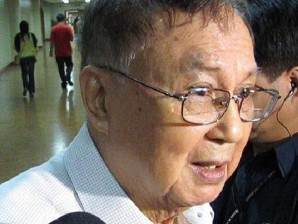MANILA, Philippines – Malacañang on Sunday said it respected the views of former Senator Joker Arroyo but belied his claims that it had skirted the constitutional prohibition on military bases with the signing of the Enhanced Defense Cooperation Agreement.
Communications Secretary Herminio Coloma pointed out that there was a “clear provision that the US would not establish a permanent military presence or base in the Philippines” and that access to agreed locations “will be at the invitation of the Philippines government.”
Arroyo earlier told Inquirer that the EDCA was worse than having foreign bases, which is prohibited by the Philippine Constitution, in the country since it allows local bases to be used by American forces.
“Nowhere in the MDT in 1951 did the Philippines agree that the US can have military bases in the Philippines, which the 1987 Constitution forbids, without a treaty. Nor did the MDT envision that Philippine military bases could be shared with and jointly used by a foreign power,” he said, referring to the Mutual Defense Treaty of the two countries.
The EDCA, signed on April 27 hours before the state visit of US President Barack Obama, allows the access and operational control of Philippine military facilities by US forces.
But Coloma insisted that there was nothing wrong with the agreement.
“We respect the views of Senator Arroyo and other leaders on the Enhanced Defense Cooperation Agreement (EDCA). Consistent with the President’s guidelines, the agreement has the following main features,” he said before enumerating the following information:
1. Clear provision that the US would not establish a permanent military presence or base in the Philippines.
2. US access to and use of designated areas in Armed Forces of the Philippines-owned and –controlled facilities will be at the invitation of the Philippine government.
3. Prior consent of the Philippines through the Mutual Defense Board (MDB) and Security Engagement Board (SEB) with regard to US access and use of agreed locations, which may be lifted in an annex and further described in implementing arrangement.
4. Philippines’ retention of primary responsibility for security of the agreed locations.
5. Access of the AFP base commander to the entire area of the agreed locations.
The Secretary said they also respect the decision of groups who want to question the EDCA before the Supreme Court.
“Iginagalang po natin ang mga kuro-kuro ng mga hindi sumasang-ayon, at malinaw naman po sa ating sistema ng demokrasya na mayroong mga hakbang na maaari silang gawin, tulad ng pagdudulog sa ating Korte Suprema. Mainam po sigurong hintayin na lang natin kung magaganap nga ‘yan,” he said.
(We respect the opinion of those who do disagree, and it is clear in our democratic system that they can resort to filing a petition before the Supreme Court. It is perhaps proper to wait for such actions.)
He also called on the public to understand and accept the agreement, which was entered into by the government for the welfare of the nation.
“Sa buong proseso ng pakikipagtalakayan sa Estados Unidos hinggil sa kasunduang ito, wala pong ibang isinaalang-alang ang ating Philippine panel kundi ang pambansang interes ng Pilipinas,” Coloma said.
(During our talks with the United States on the agreement, the Philippine panel did not think of anything else but the national interest of the Philippines.)
RELATED STORIES
What is the Enhanced Defense Cooperation Agreement and what does it mean for PH?
No mention of China at signing of defense deal
Obama: Allies never stand alone
